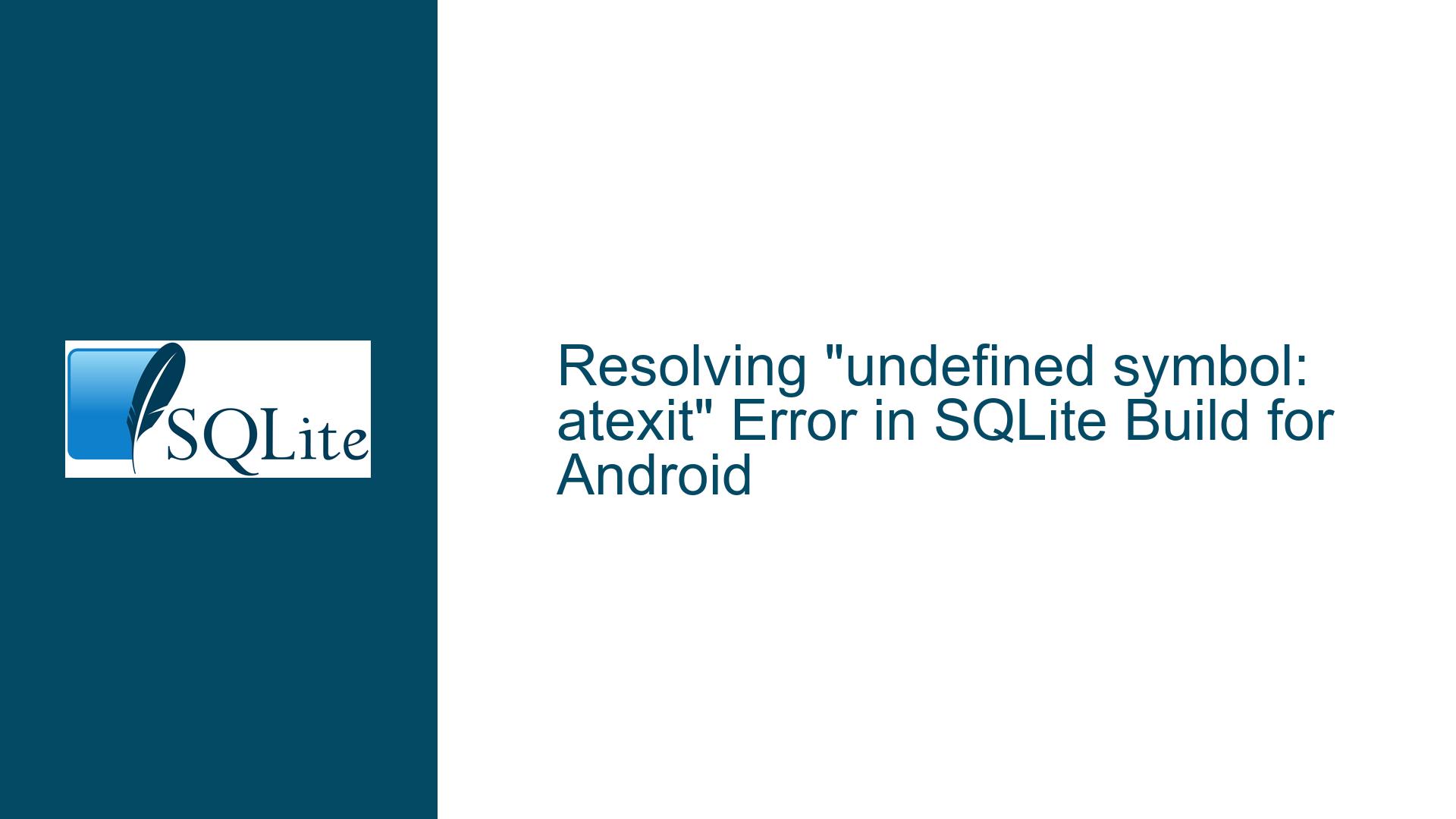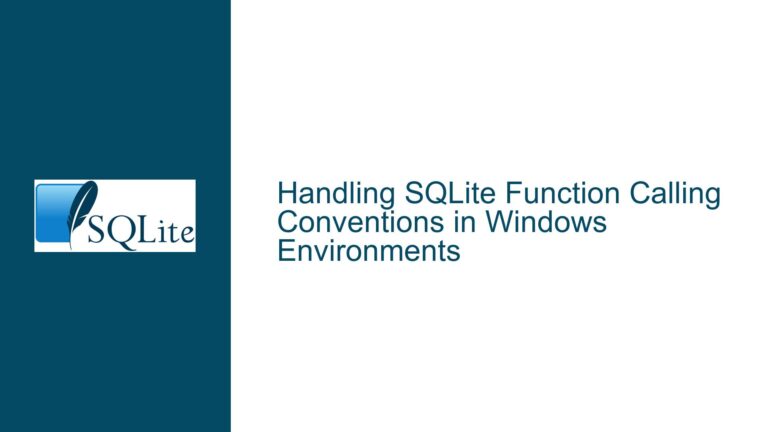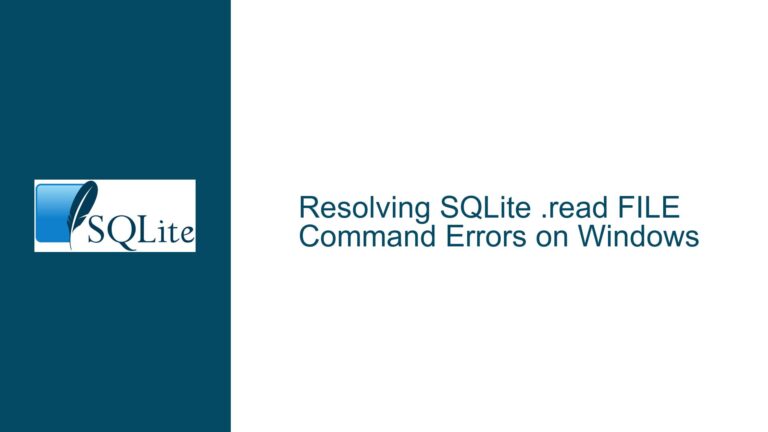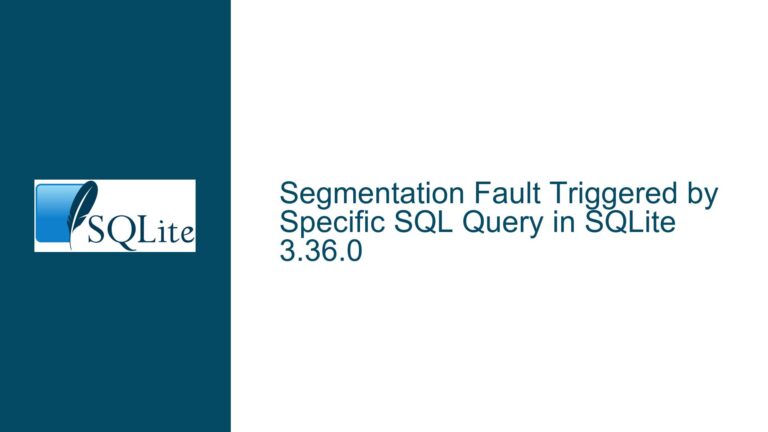Resolving “undefined symbol: atexit” Error in SQLite Build for Android
Understanding the "undefined symbol: atexit" Linker Error
The error message ld.lld: error: undefined symbol: atexit is a linker error that occurs during the compilation and linking phase of building SQLite for an Android target. This error indicates that the linker (ld.lld) is unable to find the implementation of the atexit function, which is referenced in the SQLite shell code (shell.c). The atexit function is a standard C library function declared in stdlib.h, and its purpose is to register functions to be called upon program termination.
The error specifically points to the main function in sqlite3-shell.o, which is the object file generated from shell.c. The linker is unable to resolve the reference to atexit because it cannot locate the corresponding implementation in the libraries provided during the linking stage. This issue is particularly notable when building SQLite version 3.42.0, whereas version 3.41.2 builds successfully under the same conditions.
The root cause of this problem lies in the build environment and the linker’s inability to locate the necessary library containing the atexit implementation. This could be due to missing or incorrectly specified libraries in the linker command, changes in the build configuration between SQLite versions, or differences in the Android toolchain used for compilation.
Investigating the Missing atexit Implementation in the Build Environment
The atexit function is part of the C standard library, typically provided by libc (the C runtime library). However, in certain build environments, especially those targeting embedded systems or cross-compilation scenarios like Android, the standard library implementation may differ or require additional configuration. The error suggests that the linker is not being directed to the correct library containing the atexit implementation.
One possible cause is that the Android build environment uses a custom or minimal C runtime library that does not include atexit. Alternatively, the linker command may not be explicitly specifying the necessary library paths or flags to include the standard C library. Another factor could be changes in the SQLite build configuration between versions 3.41.2 and 3.42.0, such as the inclusion of additional dependencies or modifications to the build scripts.
To diagnose this issue, it is essential to examine the linker command used during the build process. The command should include the appropriate library paths and flags to ensure that the standard C library is linked correctly. Additionally, comparing the build configurations and linker commands between the working (3.41.2) and failing (3.42.0) versions of SQLite can help identify discrepancies that may be causing the error.
Resolving the Linker Error and Ensuring a Successful Build
To resolve the undefined symbol: atexit error, follow these steps:
Verify the Linker Command: Inspect the linker command used during the build process. Ensure that it includes the necessary flags to link against the standard C library (
-lc). For example:ld.lld -o sqlite3 sqlite3-shell.o -lcIf the command is missing
-lc, add it explicitly.Check Library Paths: Ensure that the linker is aware of the paths to the standard C library. This can be done using the
-Lflag to specify library directories. For example:ld.lld -o sqlite3 sqlite3-shell.o -L/path/to/lib -lcReplace
/path/to/libwith the actual path to the library containingatexit.Compare Build Configurations: Compare the build configurations and linker commands between SQLite versions 3.41.2 and 3.42.0. Look for differences in library dependencies, linker flags, or build scripts that may affect the linking process.
Test the
atexitFunction Independently: Create a simple C program that uses theatexitfunction and attempt to compile and link it using the same build environment. This can help isolate whether the issue is specific to SQLite or a broader problem with the build environment. For example:#include <stdlib.h> #include <stdio.h> void cleanup() { printf("Cleanup function called\n"); } int main() { atexit(cleanup); printf("Main program running\n"); return 0; }Compile and link the program:
clang -o test_atexit test_atexit.c -lcIf this fails with the same error, the issue is likely with the build environment rather than SQLite.
Update the Build Environment: Ensure that the Android NDK (Native Development Kit) and toolchain are up to date. Older versions may have incomplete or incompatible standard library implementations.
Modify SQLite Build Scripts: If the issue persists, consider modifying the SQLite build scripts to explicitly include the necessary libraries and flags. For example, update the
Makefileor build configuration files to ensure-lcis included in the linker command.Consult Documentation and Community: Review the SQLite and Android NDK documentation for any known issues or additional configuration steps required for building SQLite on Android. Engage with the SQLite and Android developer communities for further assistance.
By following these steps, you should be able to resolve the undefined symbol: atexit error and successfully build SQLite for your Android target. If the issue persists, consider reaching out to the SQLite development team or seeking assistance from experienced developers familiar with the Android build environment.






